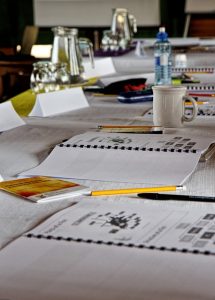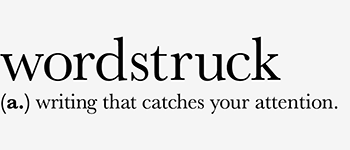I run writing training and tone of voice workshops to help business people write communications that connect with their customers.

I don’t know how it happens, but sometimes the act of putting words on a page, or these days, tapping characters onto a screen, makes people sound different. Maybe it’s the thought that this is business, that makes some companies come over all stuffy and formal. You can almost hear the pin-stripe suit and the overly tight collar (even when they’re actually wearing jeans and a T-shirt).
My aim when I run one of these workshops is to help people sound more like themselves. Or at least, more like a living, breathing human being, than a faceless corporate drone.
My training formula
When it comes to writing, or any kind of training, I apply a very simple formula: See one. Do one. Teach one. I’ve used it many times in lots of different types of training and it really works.
See one
Showing someone how to do something, or demonstrating good practice is a great starting point. In my writing training, I might do this by picking out some good, and not so good, examples of writing that I see the businesses using already.
Or I might take some memorable marketing straplines and invite people in my workshop to fill in the missing words.
It’s easy enough to demonstrate good examples, or how things should or can be done. What I help to do with ‘see one’ is to unpick why they are good examples. What works well, what doesn’t work so well, what could be better and so on.
Most people instinctively know, or understand what sounds good when it comes to communications. I can help you understand why that happens and how you can use that to your advantage in your business.
Do one

It’s all very well seeing and being shown how to do something. But the real way to make any kind of training stick is to put it into practice.
That’s why you won’t find me standing at the front of a room giving a lecture when I do my writing training. It’s you who will be doing the work, thinking, scribbling things down, trying out new ways of writing. And I’ll try to make sure you have things to work on well after the session has ended too.
My workshops and training sessions offer a chance to get away from everyday distractions and really think about how you communicate, who your audience are and the language you use. It can be refreshing, eye-opening and illuminating.
While you’re playing games with language and testing out new things in the safe confines of a training session, my aim is always to make what you learn relevant to you and your business.
Teach one
I used to do quite a bit of practical training when I worked at the BBC, showing new reporters how to use digital editing programs, or to use a content management system to publish web pages. That’s when I discovered, that you only really know you’ve understood something when you have to share it with someone else.
Finding new ways to explain something you know well can be a challenge. I’ve learned to adapt to lots of different styles of learning, from those who learn best from seeing or hearing examples, to those who like to get hands on and move around as they take in new information.
In training other people, I’ve often found I have to explain something in a different way, or been challenged to look at something I take for granted from a new angle. It’s a big confidence boost for me to see and hear people I’ve trained passing on what they’ve learned to others.
When training gets tricky
I have had workshops when I’ve expected 12 people and only 4 turned up. I had to do some rapid re-planning for group exercises. But I have learned to adapt to almost anything (I think).
When I’ve done training sessions in large corporate environments, I sometimes got the sense that people had been told to come to my workshop, but didn’t really know why they were there.
At times like this I felt like a stand-up comedian in front of a tough crowd. But like the best stand ups, I had belief in my material and kept going, trying to engage with my audience and find a common point of interest that would get them on my side.
Common points of interest would often be ‘things that other people write that make us squirm’, or ‘my boss says I shouldn’t say…’
My favourite training sessions
The best writing training sessions are when people are really engaged and ask questions or challenge points I make.
When someone asks me ‘Why?’ or says “But we have to do it like this…” I know they are taking an interest and I have a great opportunity to make that session really relevant.
Always learning, always improving
All writers are magpies. We steal inspiration, words, phrases and ideas from anywhere and everywhere, then make them our own. I do the same with training courses. I’ve had the benefit of some excellent ones, from Dark Angels, 26, The Writer and Scarlett Abbott, to name just a few.
As well as learning about the subject of the course, I try to take away something that I can apply to my own workshops.
Was there a good ice-breaker? How was the session structured? How was the information presented? And when I can, I’ll pick the brains of other people who do training sessions. They are always very generous.
I’ve learned how to create and run my writing training workshops by watching, listening, thinking and doing; through experience and analysis. I’m always looking for things that I can learn from, so I can improve my skills as a trainer.
What are your top tips for a great training session? How do you prefer to learn?
Need writing training in your business? Want to find out more about the workshops I offer? Please get in touch.

Comments are closed.